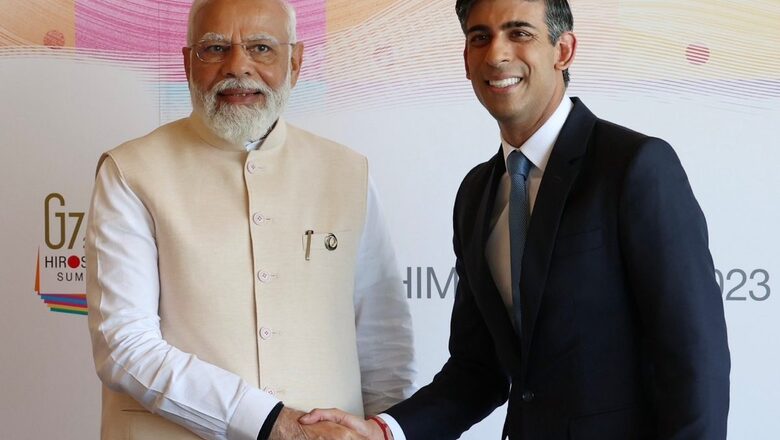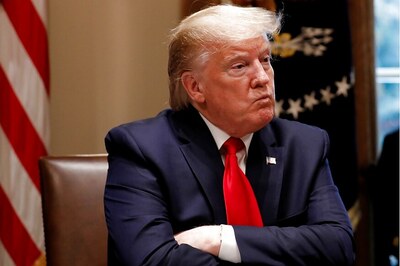
views
This week, officials from India and the United Kingdom will huddle together to iron out differences over the Free Trade Agreement (FTA) that is in the works since 2021. Indications are that the talks could be completed by this October or November. Significant progress has been made already. Of the 26 chapters proposed in the FTA, the two countries are believed to have agreed on at least 19. Besides, negotiations are also underway on a separate bilateral investment treaty.
Last month, Indian Union Commerce and Industry Minister, Piyush Goyal and Commerce Secretary, Sunil Barthwal visited London for the 11th round of bilateral talks on the FTA. Now, the ongoing 12th round focus primarily on issues like duty concessions on whisky and automobiles, apart from matters relating to services.
India was the UK’s 12th largest trading partner for four quarters till March, accounting for 2.1 per cent of the UK’s total trade. Bilateral trade between India and the UK currently stands at $20.36 billion. That’s a rise from $17.5 billion in 2021-22. With the FTA, both countries want to take the next big step. For the UK, signing an FTA and bilateral investment treaty with India will be a big win after quitting the European Union (EU).
India-UK FTA To Be A Trendsetter
Once concluded, this will be India’s most complex FTA agreement to date and will serve as a standard template for future FTA negotiations. For instance, an FTA with the UK could pave the way for India signing similar agreements with more developed nations and blocs, like the European Union, Canada and even the United States. Here is some related data:
• Bilateral trade between India and the US has increased by 7.65 per cent to $128.55 in 2022-23 as against $119.5 billion in 2021-22. It was $80.51 billion in 2020-21. So bilateral trade between India and the US is expanding fast.
• The EU is India’s third-largest trading partner, accounting for €88 billion worth of trade in goods in 2021. Trade in services between the EU and India reached €30.4 billion in 2020.
• Bilateral trade between India and Canada stands at around $6.47 billion. So, there’s a lot of scope for improvement here.
What’s The Holdup?
FTA negotiations between India and the UK have been rocky from the start, and not without good reason.
• India is keen to protect its domestic market, especially at a time when the government is going big with Make in India.
• India is among the biggest service exporters to the UK. So, it is seeking easier immigration rules for skilled professionals from the country in sectors like IT and healthcare, and for students.
• The UK, in turn, is advocating for better access to Indian markets. It wants lower tariffs, especially on products like scotch whisky and automobiles.
• So, while India is agreeing to cut tariffs on British car and Scotch imports, the UK has reportedly agreed to relax some visa rules for Indian professionals.
India is also pushing hard to incorporate a social security arrangement into the FTA with the UK. This would ensure that Indian professionals working in the UK do not unnecessarily pay social security contributions that they are unable to avail of benefits from.
Why India Did Not Rush With Negotiations
India is not a country that readily enters into free trade agreements. India opted out of the Regional Comprehensive Economic Partnership (RCEP) with Indo-Pacific nations in November 2019 due to China’s deep-running influence in the setup. Ever since, India has not signed a proper FTA with any country.
It is worth mentioning here that in the past decade, India had signed trade agreements/FTAs with the ASEAN, South Korea, Japan, Singapore, Mauritius, Australia, the UAE and Malaysia. But the sentiment in Delhi has been that India has not benefitted fairly from several such agreements.
India is very concerned about its domestic market, given how it wants to go big on manufacturing. The Modi government is right in being wary of India becoming a prisoner of any Free Trade Agreement, or even one that would put New Delhi at a disadvantage.
What Are The Red Flags?
New Delhi cannot be seen as very accommodating towards the UK, as this would impact India’s negotiating power in future deals with a variety of countries. India has drawn certain red lines for the UK, saying there are areas where it will not compromise. These include the production of generic medicines, regulatory data protection, and the inclusion of small and medium enterprises (SMEs) in government procurement.
Here are some of the concerns that have been flagged over the proposed FTA:
• Critics argue that the UK might benefit more from the FTA than India.
• Many major Indian corporations may choose to invest in the UK once FTA is signed, as the latter offers better access to third markets.
• Indian companies may find it beneficial to relocate production to the UK. This would adversely impact the Make in India and Aatmanirbhar Bharat campaigns.
• British governments are often critical of India, even if Rishi Sunak has proven to be rather a pro-India force in London lately. Elections in the UK are due next year. A change in government might change the equation between New Delhi and London. Besides, the UK also has substantial ties with Pakistan. Khalistani activity in the UK is on the rise too. So, India is rightly cautious about the political implications of an FTA.
• There is also the fear of a brain drain to the UK, as aspirational Indians move West seeking higher paying jobs.
However, the pace of negotiations has recently picked up, suggesting that both India and the UK are keen to sign the deal soon. Both India and the UK are heading to elections next year. Therefore, the sentiment within both governments is to conclude FTA negotiations and sign the deal before the crucial polls.
The British are all the more desperate because a trade deal with India can compensate for the economic setbacks caused by Brexit. But the disregard with which its political establishment views India is reflected in multiple instances like the airing of the controversial BBC documentary, support for Khalistanis and their willingness to turn a blind eye to Pakistani hostility.
The erstwhile colonial power may do well to remember that gone are the days when it could arm-twist India. Now, any FTA would be signed on India’s terms alone, and London knows it will have to agree to such terms if it wants to relish the fruits of India’s tremendous market.
Views expressed in the above piece are personal and solely that of the author. They do not necessarily reflect News18’s views.


















Comments
0 comment